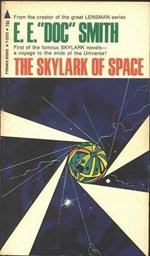 Any type of rational analysis of these novels would be forced to conclude that they just don’t work, plain and simple. Smith’s setting is improbable, his plot is riddled with clichés, and his characters are laughably drawn in the extreme. When you learn for example that Richard Seaton is the best physicist of his generation… and the best magician… and the best gunman… Your willing suspension of disbelief threatens to cry out and drop dead on the spot. These people aren’t human!
Any type of rational analysis of these novels would be forced to conclude that they just don’t work, plain and simple. Smith’s setting is improbable, his plot is riddled with clichés, and his characters are laughably drawn in the extreme. When you learn for example that Richard Seaton is the best physicist of his generation… and the best magician… and the best gunman… Your willing suspension of disbelief threatens to cry out and drop dead on the spot. These people aren’t human!
Ah! There we go.
These characters aren’t human: They’re demigods strutting across the cosmos. And you can either choose to rebel at the sheer improbability of it all, or you can accept Seaton for what he is and thrill at what he can accomplish.
Whether by chance or by design, Smith embraces a mythic tone and tells an epic legend of the spaceways. And, on that level, these are fun little books even by the standards of today.
But they become particularly impressive if you can cast your mind back to the time when they were written and imagine reading them in the pulps of the 1920s. If you can do that, then you get to watch as E.E. “Doc” Smith almost single-handedly creates science fiction as we know it today. It is not an exaggeration in the least for me to say that I cannot recall the last science fiction novel I read which was not, in some way, influenced by the ideas and concepts which Smith introduces in the original Skylark novels. (At the very least you have to give Smith justice and remember that he didn’t write clichés; he created ideas of such enduring power that they became clichés.)
Let’s talk a little about the individual volumes:
Skylark of Space is almost certainly the least satisfying entry in the series. It’s a first novel, and it shows a lot of the inconsistency which is typical for a first novel. Perhaps the biggest problem, however, is that it seems to take Smith a while to settle down into the mythic pace that makes the series work. It’s one thing for Seaton the Demi-God to accomplish three impossible things before breakfast; it’s quite another for Seaton the Merely Human to do so.
What Skylark of Space does have going for it, however, is that it’s the first. Not just the first Skylark novel, but the first space opera; and the first interstellar voyage; and the first… Well, you get the idea. So the degree to which you enjoy this novel will depend a lot on how much of a thrill you can get out of reading a literary revolution.
In any case, it’s with the second volume – Skylark Three – that this series really hits its stride: The mythic quality of the series has found consistency; Smith’s epic vision of intergalactic space opera has been fully realized; and the plot is firing on full jets now. So even if you try Skylark of Space and find nothing more than a clunky and out-dated piece of cliché, I’d still recommend giving Skylark Three a chance to change your mind.
Once Smith has found his rhythm in Skylark Three, he brings it to a brilliant crescendo in Skylark of Valeron.
One of the great things about this series is that Smith is never satisfied resting upon his laurels. With every passing chapter he’s raising the stakes, throwing out new ideas, and broadening his scope. The result is a rollercoaster ride which stretches the imagination and leaves you breathlessly turning the pages with anticipation.
Skylark DuQuesne, written about three decades after the blinding flash and deafening report of Skylark of Valeron, is a disappointment, however. The plot never quite gels and the action is frequently kept on track only by “virtue” of the author hooking it up to a locomotive and informing the reader that, in point of fact, the whole discordant mess will all tie together in the end. (Which it does… sort of. Although only by virtue of a magical deus ex machina. And I mean that literally.)
Skylark DuQuesne’s sole saving grace is that, once more, Smith conjures forth images of epic grandeur and startling creativity at a breath-taking pace. But, unfortunately, the foundation is lacking, and the result seems hollow.
I think it also needs to be said that Skylark DuQuesne brought into sharp and painful relief a problem that had been tickling at the back of my brain throughout the entire Skylark series: Viewed from any impartial angle, the heroes are genocidal fascists with a disquieting belief in the Cult of the Youthful Genius as the Natural Rulers of Civilization. The villains they oppose are distinguished only by being even MORE genocidal and fascist in their ideology.
In bizarre contrast to this, the novels also feature an equality of gender and skin color almost modern in its sensibility and profoundly progressive for the 1920s and ‘30s. (The only thing which dates the treatment is that Smith, quite rightly in my opinion, wasn’t willing to pretend that such equality was a fact of life in 1920’s America.)
Fortunately, the fast-paced action of the novels generally tends to minimize the genocidal and fascistic tendencies of the main characters. And a charitable interpretation would be that, in the situations they find themselves in, the characters simply have no choice: Their only salvation lies in decisions of an absolute and irrevocable kind. But every so often I would find myself thinking about the implications of what I was reading, and then I would be left with the disquieting sensation that I was reading a novel about brave Nazi super-scientists thwarting the tyrannies of Stalinist Russia by blasting the entire Asian continent off the face of the planet.
But I digress.
This was the first time I’ve read the Skylark novels. It won’t be the last. When E.E. “Doc” Smith is firing on all jets, reading his novels is just plain fun. And with Skylark Three and Skylark of Valeron, those jets are on full-blast. In fact, I had such a blast reading these novels that I’m going to pick up Smith’s Lensmen series next for a quick re-read.
GRADES:
SKYLARK: C+
SKYLARK THREE: A-
SKYLARK OF VALERON: A-
SKYLARK DUQUESNE: C












